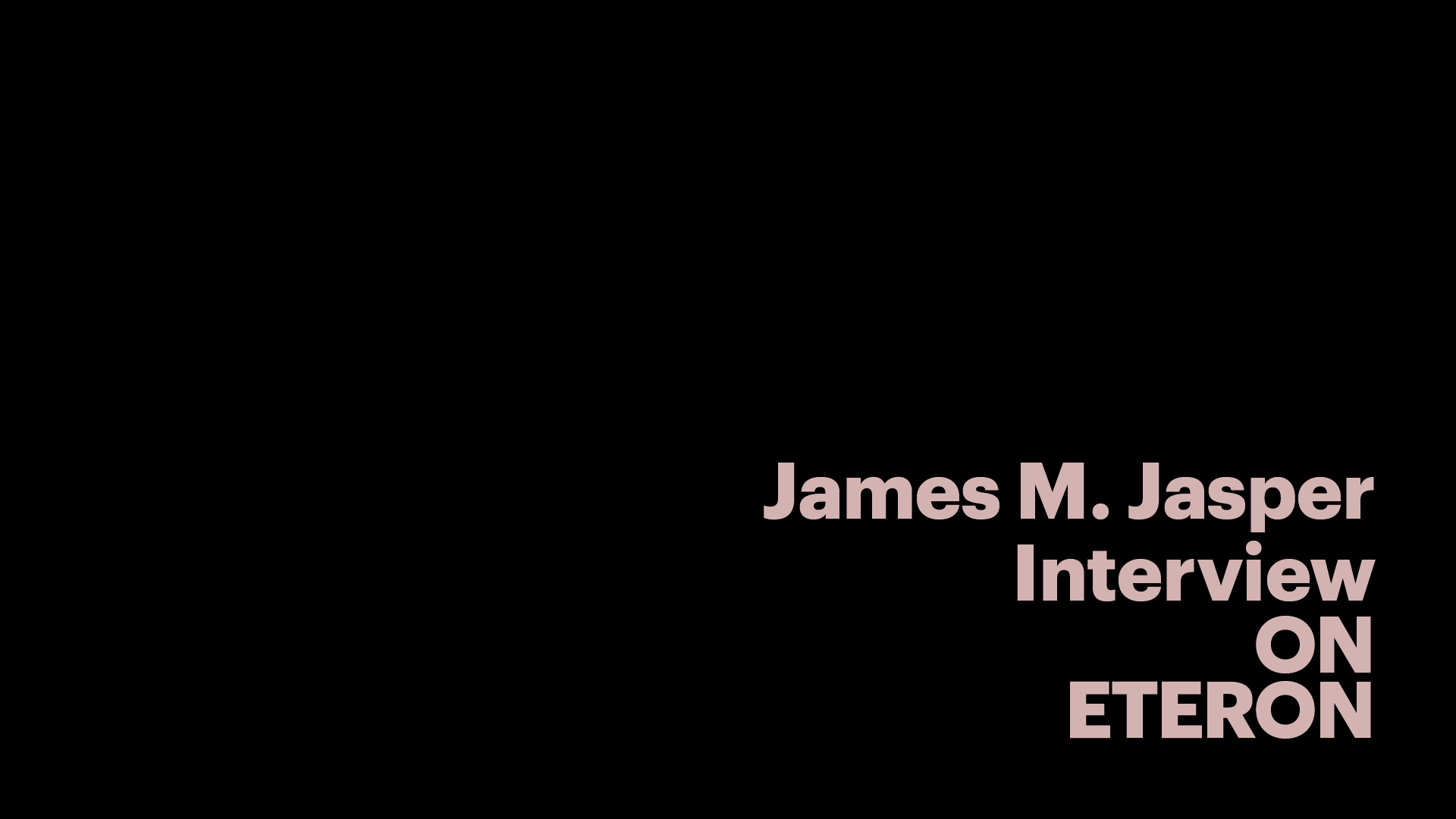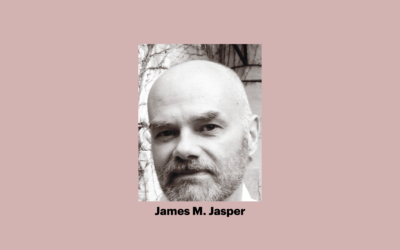
Emotions and social movements. A conversation with James M. Jasper
At the end of June 2023, Costas Gousis and Loukia Kotronaki conducted a video interview with James M. Jasper, a sociologist who has made a major contribution to social movements theory by initiating the cultural approach in the study of collective action. James M. Jasper is, among other works, the author of The Art of Moral Protest and The Emotions of Protest.
In the context of Eteron’s “Youth – Voice On” project, we discussed the role of emotions in social movements, meanings and uses of the concept of “moral shock” in the field of contentious politics, the electoral rise of the right wing and the alt-right, the hopes, fears and low expectations of the youth and youth research as an interesting laboratory for studying socialization and mobilization.
Below you can find the transcript of the interview.
Costas Gousis: Many social scientists and social movement scholars often tend to ignore emotions as an analytic dimension. In contrast, your broader work has significantly contributed to a theory of action that focuses on emotional dynamics, or as you put it in your book The emotions of Protest “Brains can feel and hearts can think”. What can we learn about politics and protest when we move emotions to center-stage?
James M. Jasper: Right, that’s a big question. Let me try to summarize it by saying the following: if you want a theory of action as opposed to a theory of structure and constraint – which a lot of social movement theories are – if you care about action you have to have emotions in there.
Emotions are what give our action direction, they give it energy or they take energy away. They
guide us through life in a way through different streams of action. So, it’s really impossible to imagine a theory of action that’s not driven by emotions. For example, the simple interest–driven notions of rational choice theory really have no way of explaining why we want what we want, why we have alliances with the people we do, why we choose certain tactics rather than others; all of these things are emotional processes. So, we feel our way through life, through action and as you break down action into its fundamental parts either at the level of the individual, ultimately, or the level of interactions with others, emotions are the driving force. And the more specific we can be about those emotions the better we will understand social action.
What we’re always trying to do in a social explanation is to break it down into the most fundamental parts, so that if I say “I did this because I was jealous” everybody accepts that and people understand what jealousy is or what indignation is. When you say “I was angry” or “I was indignant”, people say “oh yes, that’s a satisfactory explanation” and we don’t have to push any deeper to understand that action. I think that’s why emotions are ultimately the main building blocks of a theory of action, political action but all sorts of other kinds of action too, since it’s not restricted to politics.
Loukia Kotronaki: One of the most prominent concepts you have introduced for explaining the outburst of collective action in the absence of previous organizational embeddedness is “moral shock”. Could you, please, define its main features and functions in the field of contentious politics? Can you please tell us if all moral shocks operate in the same way independently of the political environment or conjuncture they appear?
James M. Jasper: A moral shock is, in my view, when something happens that gets our attention and makes us realize the world is different from how it seemed to us. It requires some rebuilding some of our feelings or of our thinking about the world to make things right again, so it’s a puzzle. It’s a challenge to who we are and how we view the world. Some shocks can be paralyzing and they may not lead to action at all, they can lead to depression or resignation. But under certain circumstances they can also motivate action. Those circumstances are often the standard factors of mobilization, such as networks of people we know, organizations at work, available resources, things for us to do. That’s a standard way people get mobilized.
But even in the absence of those, shocks can be so mobilizing, they can be so activating that people will go and find networks that they are not yet part of and they will join them, they will seek out organizations or sometimes they will even start their own organizations – although that’s an extreme case. So, shocks can motivate action and I originally came up with the idea to explain why people join the movement even when they don’t know anybody in the movement or even when they’re not part of networks.
However, what has happened over time is that people have used this concept to talk about people who were already in a movement. And their moral shock consists of re-energizing them, pushing them to participate more. They they don’t change their point of view – very few people ever change their point of view – but the moral shock reminds them why they have been active, why they believe in human rights or whatever they have been active in and it makes them want to do more and brings them back into fuller activity because of the energizing part of the shock. The way the concept has been used more recently is sort of keeping a movement going on in the face of adverse events that are rather shocking.
Loukia Kotronaki: We know that there is a negative correlation between low expectations and positive motivations to participate in both conventional and non-conventional forms of collective action. According to the findings of our research, “Generation Z” seems to be a generation of low expectations without any ambition of future social change. Nevertheless, this pessimism is not translated into a reluctant attitude vis-à-vis the electoral process. How can this paradox be decoded? What patterns of love/hate -and of relevant social activity- are likely to be forged in low expectation cognitive and emotional regimes?
James M. Jasper: I can speak from the US experience where I think there was a lot of cynicism about electoral politics among activists on the Left. And there was a lot of cynicism about social change after all we lived through George W. Bush and then Donald Trump came along. Barack Obama has raised a lot of hopes that were then disappointed, were dashed and I think that explains the Occupy Wall Street movement. So, there are a lot of reasons to be sort of cynical and to have low expectations about protests and politics in general. But then one thing that happened here was when Trump was elected, these people that were fairly cynical about electoral politics realized “oh my god, things can get worse, elections really do matter” and so there was a sort of surge of interest I think in mundane activities like voting.
Even though the hopes were not high for positive social change, the fears of threats of deterioration under a far right and crazy President were enough to motivate people at least to vote. So, you have different sets of motivations and different arenas perhaps, so you might have a different set of hopes and outrage in electoral politics than you do in social movements and protest politics. Electoral politics might seem low cost but in fact a useful way to act, at least that’s my sense. It’s very easy to be cynical about
electoral politics but then things like Donald Trump happen.
Costas Gousis: Indeed, in many recent elections, like for example the Greek parliamentary elections, we are seeing both the right-wing and the extreme right wing (the alt-right etc.) on the rise. Trying to explain this reactionary development, many analysts are stressing the irrationality of the voters and the triumph of emotions over reason. However, as you argue in your work we should move beyond these sterile debates over the rationality of voters and understand that the distinction between beliefs and emotions is wrongheaded. We would like to ask you to elaborate on that and explain what is, then, the feeling-thinking package behind the rise of the extreme right-wing?
James M. Jasper: Well there are what I call affective commitments or affective loyalties which are emotions that are long standing, that really guide our goals in life, our affiliations and we react to things on the basis of those background emotions. For example, a certain kind of love of a country or love of a certain kind of group identity could be very long standing emotional loyalty that shapes what we do.
So in the case of the right, let me speak about the US right because I know more about it but I think there are parallels in a lot of other countries. So clearly one of the the key elements is a suspicion of immigrants, a dislike of foreigners, a kind of nationalism that is suspicious of anything that goes on outside the borders of your country and especially of people coming into your country. That is as much cognitive as emotional and in fact it’s a fusion of the two. I personally think that, both morally and intellectually, that’s a wrong view of the world and how the world works and what benefits the country. But I think that the cognitive elements of that are as wrong as the emotional elements. It’s hard to say it’s irrational, I think it’s wrong but that’s not the same as irrational. I just disagree with those points of view but that doesn’t mean that they are any more emotional than my commitment to tolerance, diversity, freedom and so on.
In the US there’s an additional element since we have the fundamentalist protestants – a quarter of the electorate or a quarter of the population according to some measurements who believe that the bible is literally the word of God. And they have a set of beliefs which especially right now lead to mobilizations against LGBT people and trans people. And the reason why they are targeted is that there are Christian fundamentalist preachers who are going around and sort of setting the agenda for the Republican party when it comes to what used to be called family values and is now their concern that somehow gay people are against God are sinning in some ways.
You know, any belief and any faith like that borders on the irrational but again that’s partly because it’s so alien to my atheist way of viewing the world that it’s hard for me to believe that it’s rational. But it’s certainly well padded with both symbols and cognitive claims as well as long standing emotional loyalties. That’s an element that I think is unusually strong in the US and especially in certain parts of the US but it’s not absent in other countries as well; this belief in some sort of religious guiding precepts. So, again the people on the Right – and on the Left as well – who seem way outside the mainstream have their world views that are very well developed, are quite sophisticated in their own way and they’re full of facts.
For example, the anti vaccination people in the US have evidence and facts, what they claim to be facts that look like science and usually turns out not to be really science but they cite studies; studies that have not followed the normal path of science which involves some consensus and persuasion among scientists. But to them they look like science, so these are positions that are well defended, let’s say they’re not just emotional positions but they are intellectual positions as well.
Loukia Kotronaki: You argue in your work that building confidence is crucial to all strategic action. And that, this is important because activists often “burn out” and suffer from frustration, fatigue and the negative effects of exposure to police repression. Are there any specific social movements’ mechanisms/interactions that can trigger processes of fear’s transformation into hope and diffused defeatism into contentious confidence?
James M. Jasper: Well, first of all just having a social movement is a way that people can transform despair and fear into a sense of hope. The fact that there are people out there doing something, acting, protesting against government policies. Αnd then the fact that you can join those movements and action sort of feeds itself. You go out one day to a protest and you’ re not attacked by the police οr shot at by the police, that gives you a sense “well I can go out again and it’s safer than I realized” or it makes you think, “well these people whom I’ve seen protesting for years, they actually turned out to be very decent human beings whom I like and feel comfortable with” and you join them and it makes you feel good. So, there are positive experiences of participating in a movement that then feed on themselves.
Repression is a very real thing and sometimes those fears are very real and the police do shoot protesters and lock them up. But even the repression can backfire and even more people will come into the street because they are indignant and outraged by the arbitrary police army repression. So, confidence is important not only in the sense that you can win in the end but also confidence that you won’t be harmed in acting and speaking out. Because there is also confidence that comes just from being able to voice your opinions and being part of a group that feels the same way that you do; the confidence that gives you that kind of collective identity. So movements do all these things, whether it’s inspiring leaders, in some cases in history it is arming themselves for self-protection that gives them some confidence and so on, there are all sorts of things that movements do.
Costas Gousis: Well, things are always contradictory in politicization processes. So I would like to
ask you one last question about the relation between scholars and specifically social movement scholars and activists. Because there is a new wave of activism, for example union activism in the US right now, with the new unions and young workers playing an important role like in Amazon or Starbucks. And these experiences are discussed within social movement studies but there is often no real bridge between action and academic theorization. How can we build a more productive relation between academia and everyday activism?
James M. Jasper: First, I think most social movement scholars in Europe and the US do have political activities as well and most of them at least have been involved in social movements. Actually, most of them continue to advise or do research for social movement groups. So I think there is an alliance between academics and activists but in the end academics don’t give very good strategic advice to activists. The activists are there every moment on the ground and if they’re good they have a much better sense of the right tactical moment and the right alliances than academics do. Academics have a certain distance and you know it’s good to have a certain distance because as an academic you are trying to draw broader lessons that will be useful in other movements in other times and places. So in the end the pragmatic understanding of the activist is not quite the same as the more abstracted theories and explanations of academics.
In the US most social movement scholars want to have that kind of dialogue with the activists and there are lots of conferences that include both activists and academics but there are limits to that. Academics write in a way that most activists are not going to read, no normal people would really want to read our jargon and our data collection and analysis and all the things we do as professional social scientists. So we write for different audiences in a way and it’s hard but most social movement scholars always try to write for both academic audiences and they also try to write other things for wider audiences in a more comprehensible, clearer and simpler way; maybe simple is not quite the right word but you know, academics try to write well, they just don’t always know how to do it.
Costas Gousis: Great, Loukia do you have any last remark or question?
Loukia Kotronaki: Many questions and many incentives to continue the conversation but I think that it’s ok for the moment. And I hope that we’ll have the opportunity to continue in the near future. I really hope so because your approach is very refreshing. And even if there is a geographical distance, political and social phenomena and emotional questions are very similar.
James M. Jasper: Well, exactly this suggests that with emotions we are getting down to some very basic human processes that you can find across political arenas, across cultures. Cultures differ and emotions differ somewhat across cultures but there is also a way in which you’re always going to find emotions. And, you know, anger may be a little bit different in one context or another and culture especially affects how we display emotions quite differently in different places but the emotions are still there and often, very often, they are basically the same emotions. So it’s very promising I hope.
Loukia Kotronaki: Yes it is.
Costas Gousis: It was an important contribution because our research project “Youth – Voice On” actually began with a tragic event, the deadliest train accident ever recorded in Greece. And we tried to follow the mobilizations after the train accident in Tempi focusing on the youth participation in these mobilizations. Loukia Kotronaki has prepared a research report based on a survey quantitative survey that was conducted by Eteron and was very much inspired by your work and specifically used the concept of “moral shock” to understand the role of emotions in the youth mobilizations all over Greece during March 2023. And this is a dialogue that we continue right now in light of the recent parliamentary elections, reflecting on the youth vote and more generally on the role that emotions play in political and collective action.
James M. Jasper: One thing we did not talk about is the way that young people may have somewhat different emotional processes than older people. I think the key is that with these affective orientations young people, teenagers, and early 20s are very often still working out some of these affective commitments and orientations. So both politically and in terms of their own identity and moral intuitions, they are making a lot of decisions and they are capable of going in different directions in ways that people my age are probably not going to do. So it makes studying youth a very interesting laboratory for studying socialization and mobilization.
Costas Gousis: Thanks for mentioning this and this is another reason why our discussion with you significantly contributes to our “Youth – Voice On” project and we’re looking forward to future cooperation.



